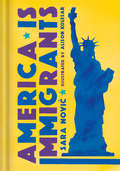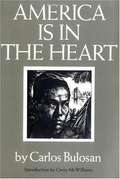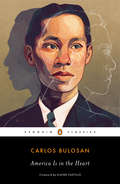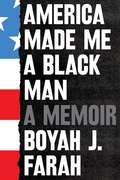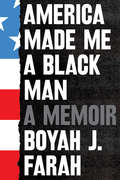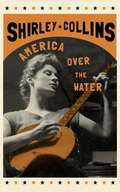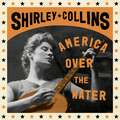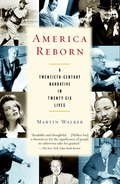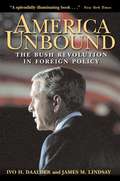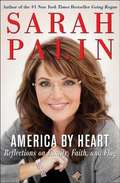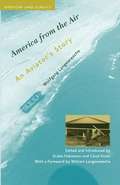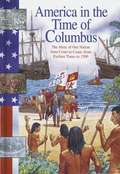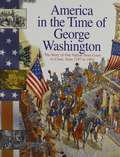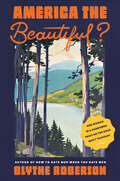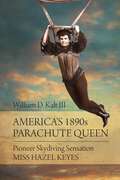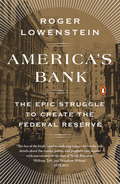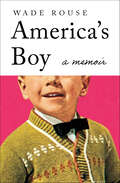- Table View
- List View
America In The Time Of Abraham Lincoln: 1815 to 1869
by Sally Senzell IsaacsUses the life of Abraham Lincoln as a reference to examine the history of the United States from 1815 to 1869.
America Is Immigrants
by Sara NovicA gorgeously illustrated collection featuring inspiring immigrants from every country in the world, celebrating the incredible range of what it means to be an American This dazzling volume brings American immigrant stories to life in short biographies written by award-winning writer Sara Nović, with charming full-color illustrations by Alison Kolesar. At a time when public debate is focused on who belongs in America, this book honors the crucial contributions of our friends and neighbors who have chosen to make this country their home. Featured within are war heroes and fashion designers, Supreme Court justices and pop stars, athletes and civil rights leaders, as well as: • the doctors who saved Ronald Reagan’s life • the creators of iconic American products like Levi’s, Chevy cars and trucks, and Nathan’s Famous hot dogs • the scientists who contributed to the Manhattan Project • the architects behind landmarks of the American skyline like the World Financial Center in New York City, the Gateway Arch in St. Louis, and the Sears Tower in Chicago • Plus these familiar names from every walk of life: Madeleine Albright • Isabel Allende • Mario Andretti • Desi Arnaz • Isaac Asimov • George Balanchine • Sergey Brin • Gisele Bündchen • Willem de Kooning • Oscar de la Renta • Marlene Dietrich • Albert Einstein • Alfred Hitchcock • Arianna Huffington • Enrique Iglesias • Iman • Grace Jones • Henry Kissinger • Mila Kunis • Hedy Lamarr • Yo-Yo Ma • Miriam Makeba • Pedro Martínez • Joni Mitchell • Sidney Poitier • Wolfgang Puck • Rihanna • Knute Rockne • M. Night Shyamalan • Gene Simmons • Nikola Tesla • the von Trapps • Elie Wiesel • Anna Wintour
America Is in the Heart
by Carlos BulosanFirst published in 1946, this autobiography of the well-known Filipino poet describes his boyhood in the Philippines, his voyage to America, and his years of hardship and despair as an itinerant laborer following the harvest trail in the rural West.
America Is in the Heart: A Personal Journey (American Autobiography Ser.)
by Carlos BulosanA 1946 Filipino American social classic about the United States in the 1930s from the perspective of a Filipino migrant laborer who endures racial violence and struggles with the paradox of the American dream, with a foreword by novelist Elaine CastilloPoet, essayist, novelist, fiction writer and labor organizer, Carlos Bulosan (1911-1956) wrote one of the most influential working class literary classics about the U.S. pre-World War II, a period and setting similar to that of Steinbeck's The Grapes of Wrath and Cannery Row. Bulosan's semi-autobiographical novel America is in the Heart begins with the narrator's rural childhood in the Philippines and the struggles of land-poor peasant families affected by US imperialism after the Spanish American War of the late 1890s. Carlos's experiences with other Filipino migrant laborers, who endured intense racial abuse in the fields, orchards, towns, cities and canneries of California and the Pacific Northwest in the 1930s, reexamine the ideals of the American dream. Bulosan was one of the most important 20th century social critics with his deeply moving account of what it was like to be criminalized in the U.S. as a Filipino migrant drawn to the ideals of what America symbolized and committed to social justice for all marginalized groups.Celebrate Asian American and Pacific Islander (AAPI) Heritage Month with these four Penguin Classics: America Is in the Heart by Carlos Bulosan (9780143134039) East Goes West by Younghill Kang (9780143134305) The Hanging on Union Square by H. T. Tsiang (9780143134022) No-No Boy by John Okada (9780143134015)
America Made Me a Black Man
by Boyah J FarahA searing memoir of American racism from a Somali-American who survived hardships in his birth country only to experience firsthand the dehumanization of Black people in his adopted land, the United States.&“No one told me about America.&” Born in Somalia and raised in a valley among nomads, Boyah Farah grew up with a code of male bravado that helped him survive deprivation, disease, and civil war. Arriving in America, he believed that the code that had saved him would help him succeed in this new country. But instead of safety and freedom, Boyah found systemic racism, police brutality, and intense prejudice in all areas of life, including the workplace. He learned firsthand not only what it meant to be an African in America, but what it means to be African American. The code of masculinity that shaped generations of men in his family could not prepare Farah for the painful realities of life in the United States. Lyrical yet unsparing, America Made Me a Black Man is the first book-length examination of American racism from an African perspective. With a singular poetic voice brimming with imagery, Boyah Farah challenges us to face difficult truths about the destructive forces that threaten Black lives. By affirming that there is a &“melancholy redemption in possessing a Black body in America,&” he also attempts to heal a fracture in Black men&’s identity in this unforgettable book.
America Made Me a Black Man: A Memoir
by Boyah J. FarahA searing memoir of American racism from a Somalian-American who survived hardships in his birth country only to experience firsthand the dehumanization of Blacks in his adopted land, the United States.“No one told me about America.” Born in Somalia and raised in a valley among nomads, Boyah Farah grew up with a code of male bravado that helped him survive deprivation, disease, and civil war. Arriving in America, he believed that the code that had saved him would help him succeed in this new country. But instead of safety and freedom, Boyah found systemic racism, police brutality, and intense prejudice in all areas of life, including the workplace. He learned firsthand not only what it meant to be an African in America, but what it means to be African American. The code of masculinity that shaped generations of men in his family could not prepare Farah for the painful realities of life in the United States. Lyrical yet unsparing, America Made Me a Black Man is the first book-length examination of American racism from an African outsider’s perspective. With a singular poetic voice brimming with imagery, Boyah challenges us to face difficult truths about the destructive forces that threaten Black lives and attempts to heal a fracture in Black men’s identity.
America Over the Water
by Shirley Collins'Shirley is a time traveller, a conduit for essential human aches, one of the greatest artists who ever lived' Stewart Lee'Without doubt one of England's greatest cultural treasures' Billy BraggIn America Over the Water, celebrated English folksinger Shirley Collins offers an affecting account of her year-long stint as assistant to legendary musical historian and folklorist Alan Lomax. Together, they travelled to Virginia, Kentucky, Alabama, Mississippi, Arkansas, and Georgia, encountering Mississippi Fred McDowell, Muddy Waters and many others, in their tireless work to uncover the traditional music of America's heartland. Blending the personal story of Shirley Collins' relationship with Lomax and offering a unique first-hand account of a country on the brink of the civil rights era, America Over the Water cuts right to the heart of the blues in a fascinating account of Collins' and Lomax's ground-breaking journey across the southern states of the USA to record the music that started it all. Originally published over fifteen years ago, this definitive edition includes a new introduction by Shirley Collins.
America Over the Water
by Shirley Collins'Shirley is a time traveller, a conduit for essential human aches, one of the greatest artists who ever lived' Stewart Lee'Without doubt one of England's greatest cultural treasures' Billy BraggIn America Over the Water, celebrated English folksinger Shirley Collins offers an affecting account of her year-long stint as assistant to legendary musical historian and folklorist Alan Lomax. Together, they travelled to Virginia, Kentucky, Alabama, Mississippi, Arkansas and Georgia, discovering Mississippi Fred McDowell and many others, in their tireless work to uncover the traditional music of America's heartland. Blending the personal story of Shirley Collins' relationship with Lomax and offering a unique first-hand account of a country on the brink of the civil rights era, America Over the Water cuts right to the heart of the blues in a fascinating account of Collins' and Lomax's ground-breaking journey across the southern states of the USA to record the music that started it all. Originally published over fifteen years ago, this definitive edition includes a new introduction by Shirley Collins.
America Over the Water
by Shirley CollinsIn America Over the Water, celebrated English folksinger Shirley Collins offers an affecting account of her year-long stint as assistant to legendary musical historian and folklorist Alan Lomax. Together, they travelled to Virginia, Kentucky, Alabama, Mississippi, Arkansas and Georgia, discovering Mississippi Fred McDowell and many others, in their tireless work to uncover the traditional music of America's heartland. Blending the personal story of Shirley Collins' relationship with Lomax and offering a unique first-hand account of a country on the brink of the civil rights era, America Over the Water cuts right to the heart of the blues in a fascinating account of Collins' and Lomax's ground-breaking journey across the southern states of the USA to record the music that started it all. Originally published over fifteen years ago, this definitive edition includes a new introduction by Shirley Collins.
America Reborn: A Twentieth-century Narrative in Twenty-six Lives
by Martin WalkerHere is the story of America in the twentieth century as told through the lives of twenty-six of its most remarkable and historically crucial men and women.The people Martin Walker has chosen to portray are presidents, industrialists, artists, thinkers, entertainers, soldiers, spies, criminals, and evangelists, among others, and he makes the life of each individual serve as a framework for a discussion of the nation as a whole in a century when it was reinventing itself.Through Theodore Roosevelt, Walker examines America's ambition; through Woodrow Wilson, our idealism; through FDR, our triumph on the world stage; through Richard Nixon, our retreat into cynicism; through Bill Clinton, globalization and controversy about the right way to use America's unprecedented power.In Henry Ford he finds the creator of both the mass-market product and the mass-market consumer, and in Walt Disney, the revolutionizer not only of America's entertainment but also of the world's. William Boeing is the innovator who spurs the behemoth of American aviation; Walter Reuther defines labor's struggles; George C. Marshall represents the spread of America's economic genius in a war-ravaged Europe.In the lives of Duke Ellington, Frank Lloyd Wright, Katharine Hepburn, and John Steinbeck, Walker traces America's far-reaching cultural influences. Babe Ruth leads to a consideration of the role of sports in our society; William F. Buckley, Jr., to a discussion of conservatism; Martin Luther King, Jr., to matters of race; Betty Friedan to the shifting role of women; Billy Graham to an examination of religion; Emma Goldman to minority viewpoints and dissent; Black Jack Pershing to the place of the military; Lucky Luciano to crime and corruption; Albert Einstein to immigration; Richard Bissell to spies and the intelligence network; Alan Greenspan to finance and banking; and Winston Churchill to the American diaspora.At once intimate and wide-ranging, America Reborn is an altogether engrossing work of narrative history.From the Hardcover edition.
America Unbound: The Bush Revolution in Foreign Policy
by Ivo H. Daalder James M. LindsayAnalysis of George W. Bush's foreign policy, specifically from the start of his administration to mid 2003.
America by Heart: Reflections on Family, Faith, and Flag
by Sarah PalinIn the fall of 2009, with the publication of her #1 national bestselling memoir, Sarah Palin had the privilege of meeting thousands of everyday Americans on her extraordinary 35-city book tour. Inspired by these encounters, her new book, America By Heart: Reflections on Family, Faith, and Flag, celebrates the enduring strengths and virtues that have made this country great. Framed by her strong belief in the importance of family, faith, and patriotism, the book ranges widely over American history, culture, and current affairs, and reflects on the key values-both national and spiritual-that have been such a profound part of Governor Palin's life and continue to inform her vision of America's future. Written in her own refreshingly candid voice, America By Heart will include selections from classic and contemporary readings that have moved her-from the nation's founding documents to great speeches, sermons, letters, literature and poetry, biography, and even some of her favorite songs and movies. Here, too, are portraits of some of the extraordinary men and women she admires and who embody her deep love of country, her strong rootedness in faith, and her profound love and appreciation of family. She will also draw from personal experience to amplify these timely (and timeless) themes-themes that are sure to inspire her numerous fans and readers all across the country.
America from the Air: An Aviator's Story
by Wolfgang LangewiescheA memoir of a pilot who learned to fly in the 1930's as well as a look at America from the air as it appeared in the 1940's. At the same time it is a study of the joys of flying.
America in the Time of Columbus: From Earliest Times to 1590
by Sally IsaacsUses the life of Christopher Columbus as a backdrop to present the history of the people of America from the time the Native Americans arrived until 1590.
America in the Time of Franklin Delano Roosevelt, 1929-1948
by Sally Senzell Isaacs<P>America in the Time of... helps readers explore our nation's past by focusing on key figures in history. Each visually stunning spread features clearly written text that explains the social, political, and economic realities of the time. The series visits all areas of the United States from coast to coast, and offers information about the native as well as invading and immigrant peoples. Each book features: <br>-- beautiful reconstruction artwork, <br>-- authentic primary source photographs, <br>-- detailed maps, both modern and historical, <br>-- profiles of famous people who shaped that time, <br>-- a list of noteworthy places, and <br>-- a bibliography of fiction books to extend learning.
America in the Time of George Washington, 1747 to 1803
by Sally Senzell IsaacsBuilding a new nation is far from easy. Meet Americans such as George Washington, Thomas Jefferson, and Benjamin Franklin. Also learn about the groups, such as Native Americans, African Americans, and others.
America in the Time of Martin Luther King Jr. (1948-1976)
by Sally Senzell IsaacsAmerica in the Time of is a series of nine books arranged chronologically, meaning that events are described in the order in which they happened. In each book, most articles deal with a particular event or part of American history. This book is about America from 1948 to 1976.
America in the Time of Susan B. Anthony
by Sally Senzell IsaacsUses the life of Susan B. Anthony as a reference to examine the development of the United States from 1845 to 1928.
America the Beautiful: Together We Stand (Into Reading, Read Aloud Module 6 #1)
by Katharine BatesNIMAC-sourced textbook
America the Beautiful?: One Woman in a Borrowed Prius on the Road Most Traveled
by Blythe RobersonThe author of How to Date Men When You Hate Men examines Americans’ obsession with freedom, travel, and the open road in this funny, entertaining travelogue that blends the humorous observations of Bill Bryson with the piercing cultural commentary of Jia Tolentino.For writer and comedian Blythe Roberson, there are only so many Mary Oliver poems you can read about being free, and only so many times you can listen to Joni Mitchell’s travel album Hejira, before you too, are itching to take off. Canonical American travel writers have long celebrated the road trip as the epitome of freedom. But why does it seem like all those canonical travel narratives are written by white men who have no problems, who only decide to go the desert to see what having problems feels like?To fill in the literary gaps and quench her own sense of adventure, Roberson quits her day job and sets off on a Great American Road Trip to visit America’s national parks.America the Beautiful? is a hilarious trip into the mind of one of the Millennial generation’s funniest writers. Borrowing her Midwestern stepfather’s Prius, she heads west to the Loop of mega-popular parks, over to the ocean and down the Pacific Coast Highway, and, in a feat of spectacularly bad timing, through the southwestern desert in the middle of July. Along the way she meets new friends on their own personal quests, learns to cope with abstinence while missing the comforts of home, and comes to understand the limits—and possibilities—of going to nature to prove to yourself and your Instagram followers that you are, in fact, free.The result is a laugh-out-loud-while-occasionally-raging-inside travelogue, filled with meditations and many, many jokes on ecotourism, conservation, freedom, traffic, climate change, and the structural and financial inequalities that limit so many Americans’ movement. Ultimately, Roberson ponders the question: Is quitting society and going on the road about enlightenment and liberty—or is it just selfish escapism?
America's 1890s Parachute Queen: Pioneer Skydiving Sensation Miss Hazel Keyes
by William III KaltDeath-defying skydiver Miss Hazel Keyes thrills thousands as she leaps from her balloon with her monkey, Miss Jennie Yan Yan. Sail through the heavens with this robust, spunky woman as she earns nationwide fame for more than a decade. Miss Hazel’s life af
America's Bank
by Roger LowensteinA tour de force of historical reportage, America's Bank illuminates the tumultuous era and remarkable personalities that spurred the unlikely birth of America's modern central bank, the Federal Reserve. Today, the Fed is the bedrock of the financial landscape, yet the fight to create it was so protracted and divisive that it seems a small miracle that it was ever established. For nearly a century, America, alone among developed nations, refused to consider any central or organizing agency in its financial system. Americans' mistrust of big government and of big banks--a legacy of the country's Jeffersonian, small-government traditions--was so widespread that modernizing reform was deemed impossible. Each bank was left to stand on its own, with no central reserve or lender of last resort. The real-world consequences of this chaotic and provincial system were frequent financial panics, bank runs, money shortages, and depressions. By the first decade of the twentieth century, it had become plain that the outmoded banking system was ill equipped to finance America's burgeoning industry. But political will for reform was lacking. It took an economic meltdown, a high-level tour of Europe, and--improbably--a conspiratorial effort by vilified captains of Wall Street to overcome popular resistance. Finally, in 1913, Congress conceived a federalist and quintessentially American solution to the conflict that had divided bankers, farmers, populists, and ordinary Americans, and enacted the landmark Federal Reserve Act.Roger Lowenstein--acclaimed financial journalist and bestselling author of When Genius Failed and The End of Wall Street--tells the drama-laden story of how America created the Federal Reserve, thereby taking its first steps onto the world stage as a global financial power. America's Bank showcases Lowenstein at his very finest: illuminating complex financial and political issues with striking clarity, infusing the debates of our past with all the gripping immediacy of today, and painting unforgettable portraits of Gilded Age bankers, presidents, and politicians.Lowenstein focuses on the four men at the heart of the struggle to create the Federal Reserve. These were Paul Warburg, a refined, German-born financier, recently relocated to New York, who was horrified by the primitive condition of America's finances; Rhode Island's Nelson W. Aldrich, the reigning power broker in the U.S. Senate and an archetypal Gilded Age legislator; Carter Glass, the ambitious, if then little-known, Virginia congressman who chaired the House Banking Committee at a crucial moment of political transition; and President Woodrow Wilson, the academician-turned-progressive-politician who forced Glass to reconcile his deep-seated differences with bankers and accept the principle (anathema to southern Democrats) of federal control. Weaving together a raucous era in American politics with a storied financial crisis and intrigue at the highest levels of Washington and Wall Street, Lowenstein brings the beginnings of one of the country's most crucial institutions to vivid and unforgettable life. Readers of this gripping historical narrative will wonder whether they're reading about one hundred years ago or the still-seething conflicts that mark our discussions of banking and politics today. From the Hardcover edition.
America's Bank: The Epic Struggle to Create the Federal Reserve
by Roger LowensteinA tour de force of historical reportage, America's Bank illuminates the tumultuous era and remarkable personalities that spurred the unlikely birth of America's modern central bank, the Federal Reserve. Today, the Fed is the bedrock of the financial landscape, yet the fight to create it was so protracted and divisive that it seems a small miracle that it was ever established. For nearly a century, America, alone among developed nations, refused to consider any central or organizing agency in its financial system. Americans' mistrust of big government and of big banks--a legacy of the country's Jeffersonian, small-government traditions--was so widespread that modernizing reform was deemed impossible. Each bank was left to stand on its own, with no central reserve or lender of last resort. The real-world consequences of this chaotic and provincial system were frequent financial panics, bank runs, money shortages, and depressions. By the first decade of the twentieth century, it had become plain that the outmoded banking system was ill equipped to finance America's burgeoning industry. But political will for reform was lacking. It took an economic meltdown, a high-level tour of Europe, and--improbably--a conspiratorial effort by vilified captains of Wall Street to overcome popular resistance. Finally, in 1913, Congress conceived a federalist and quintessentially American solution to the conflict that had divided bankers, farmers, populists, and ordinary Americans, and enacted the landmark Federal Reserve Act.Roger Lowenstein--acclaimed financial journalist and bestselling author of When Genius Failed and The End of Wall Street--tells the drama-laden story of how America created the Federal Reserve, thereby taking its first steps onto the world stage as a global financial power. America's Bank showcases Lowenstein at his very finest: illuminating complex financial and political issues with striking clarity, infusing the debates of our past with all the gripping immediacy of today, and painting unforgettable portraits of Gilded Age bankers, presidents, and politicians.Lowenstein focuses on the four men at the heart of the struggle to create the Federal Reserve. These were Paul Warburg, a refined, German-born financier, recently relocated to New York, who was horrified by the primitive condition of America's finances; Rhode Island's Nelson W. Aldrich, the reigning power broker in the U.S. Senate and an archetypal Gilded Age legislator; Carter Glass, the ambitious, if then little-known, Virginia congressman who chaired the House Banking Committee at a crucial moment of political transition; and President Woodrow Wilson, the academician-turned-progressive-politician who forced Glass to reconcile his deep-seated differences with bankers and accept the principle (anathema to southern Democrats) of federal control. Weaving together a raucous era in American politics with a storied financial crisis and intrigue at the highest levels of Washington and Wall Street, Lowenstein brings the beginnings of one of the country's most crucial institutions to vivid and unforgettable life. Readers of this gripping historical narrative will wonder whether they're reading about one hundred years ago or the still-seething conflicts that mark our discussions of banking and politics today. From the Hardcover edition.
America's Black Founders: Revolutionary Heroes & Early Leaders with 21 Activities
by Nancy SandersCelebrating the lesser known but significant lives and contributions of our nation's early African American leaders, this multicultural complement to most children's books on the American Revolution covers a wide spectrum of subjects, including military, art, religion, and science. Weaving the histories of dozens of men and women--soldiers, sailors, ministers, poets, merchants, doctors, and other community leaders--to properly recognize them among the founders of the United States of America, this text gives a better sense of what these individuals accomplished and the times in which they lived. Activities include celebrating Constitution Day, cooking colonial foods, publishing a newspaper, petitioning their government, and more. This valuable resource also includes a time line of significant events, a list of historic sites to visit or explore online, and Web resources for further study.
America's Boy: A Memoir
by Wade Rouse&“A revelatory story about acceptance, pride, and the many ways even a seemingly prejudiced family can surprise us&” by the bestselling author of Magic Season (The Washington Post).Indie Next List &“Great Read&” SelectionAmerican Library Association&’s Inaugural &“Rainbow List&” Selection In this memoir, writer and journalist Wade Rouse delivers a humorous and heartwarming account of his Midwestern childhood and coming of age as a gay man. Born in Granby, a small farm town in the southwest Missouri Ozarks, Wade was a fish out of water as long as he could remember—or at least since he participated in his family&’s mock Miss America pageant when he was just five years old, clad in his grandmother&’s red &“whore&” heels and his mother&’s black-and-white polka-dot bikini. Life didn&’t get easier in Wade&’s conservative hometown, especially after his older brother died just a month after Wade graduated junior high school. It was then that Wade buried his brother—and his sexuality, so his parents wouldn&’t mourn the loss of a second son. Finally, after years of a descent into obsessive-compulsive behaviors and overeating, Wade was able to come out to himself, losing weight and gaining confidence until he had nothing left to hide. Filled with memories of happiness and heartbreak, America&’s Boy is both &“a quirky tribute to [Rouse&’s] rural Ozark family, and an easily digestible, homespun tale of a bygone era in Middle America&” (Time Out Chicago).&“A storyteller and a memoirist in the best sense of the words. . . . Reading Rouse&’s memoir is more like sitting with a good friend and a cold beer, trading stories and remembering those things that may have been painful or tragic at the time, but must now be respected for what they are.&” —Metro Weekly

